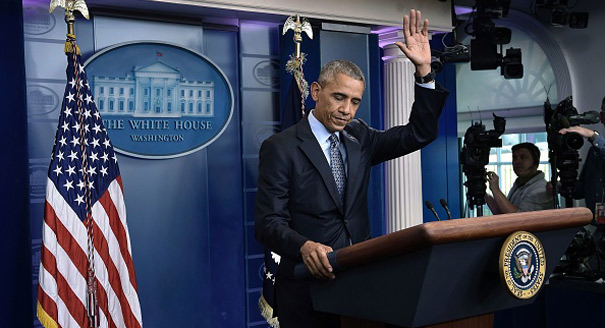Barack Obama’s last press conference as U.S. president and British Prime Minister Theresa May’s first speech spelling out her plans for taking the UK out of the EU have thrown down the gauntlet to Europeans. Yet it is far from certain that EU governments have the leadership and foresight to prepare for the immense shifts taking place in the transatlantic relationship and Europe itself.
Obama’s valedictory news conference on January 18 and another he gave earlier in Chicago, his hometown, resonated openness, honesty about foreign policy mistakes, and commitment to America’s European allies—in both NATO and the EU.
By contrast, May’s defensive speech on January 17, in which she focused on how Britain would positively thrive once it left the EU, had many contradictions. Can a Britain that espouses openness to the world realize that aim when it wants to close its doors to EU citizens—2.26 million of whom worked in Britain as of September 2016?
May argued that Britain’s ties with the Commonwealth would serve to strengthen the country’s global reach and influence. But she need only look at China’s immense economic and trading power in those countries that were once part of the British Empire. In 2014, China’s trade with African states grew to $220 billion, up from $10 billion in 2000. Moreover, the EU already has free-trade agreements that are either awaiting adoption or already in force with 32 Commonwealth countries. Depending on the departure deal it strikes with the EU, Britain may have to pull out of those agreements. In short, old trading ties are not permanent.
What is also interesting about the two speeches is that Obama’s was antinationalist while May’s was nationalist. Obama’s commitment to free trade and the expansion of bilateral trade agreements was enduring—although both Washington and Brussels could have done far more to sell the merits of the proposed Transatlantic Trade and Investment Partnership (TTIP). For Obama, trade deals were about building alliances, securing interests, and perhaps even extending values. Above all, they were about the United States helping set global standards for trade, commerce, and finance.
Meanwhile, May’s emphasis on a Britain freed from the shackles of the EU seemed to be built on the assumption that the UK could combine a particular form of British—or rather, English—nationalism with openness to the world.
This is where May and incoming U.S. President Donald Trump have something in common. They want to set their own national trading rules and conditions. With slight differences in language, Trump wants to make America great again and May wants Britain to take back control.
Trump is prepared to impose extra tariffs, particularly on the German car industry if its German bosses build plants in Mexico and then sell cars to the neighboring United States. Trump wants to protect America’s car industry—as any U.S. leader would. Given that’s the case, U.S. car manufacturers should build better cars that not only Americans but also Europeans want to buy, as a recent letter in the Financial Times argued.
May faces a similar problem. If she is convinced that Britain can forge ahead with new trade deals, then Britain will need to sell goods—specifically, goods and commodities that China, India, South America, and Africa want. This is where Britain falls short. According to a recent report by PwC, the UK, which accounts for 3.5 percent of global GDP, holds a stronger position in the global trade of services than of goods, with over 7 percent of global exports of services, compared with just over 2.5 percent of goods exports.
If May wants to revive a declining manufacturing sector, she will need a skilled workforce and a long-term investment strategy. The former will require a review of her policy to restrict immigration; the latter will require money.
As for the leaders’ approaches to Europe, Obama needed some time to understand how the EU works—and who could blame him? During his second term, he relied on Angela Merkel, the German chancellor, to keep Europe united over Ukraine, Russia, and the euro crisis rather than depend on the leaders of the EU’s institutions. But as his relationship with Merkel developed and deepened, neither articulated what kind of Europe they wanted or how they saw the future of the transatlantic relationship. In some ways, that was a lost opportunity.
Obama did, however, warn the British about leaving the EU. London, he said, speaking before the June 2016 referendum on the UK’s membership, could not expect a quick bilateral trade deal with Washington if it chose to quit the EU.
This is where a Trump presidency might be to May’s advantage. Trump’s praise for Brexit is unsettling. He quipped in recent interviews about which other EU countries might choose a similar path to Britain’s. It’s as if his views of the EU and NATO are based not on alliances, security, and values but on the balance sheet—on a cost-benefit analysis.
If that is Trump’s worldview—and if, as it seems, May puts economic nationalism before any long-term strategic analysis of what Brexit and Trumpism mean for security—then European leaders should start setting out what kind of future relationships they want with London and Washington. They don’t have much time.












